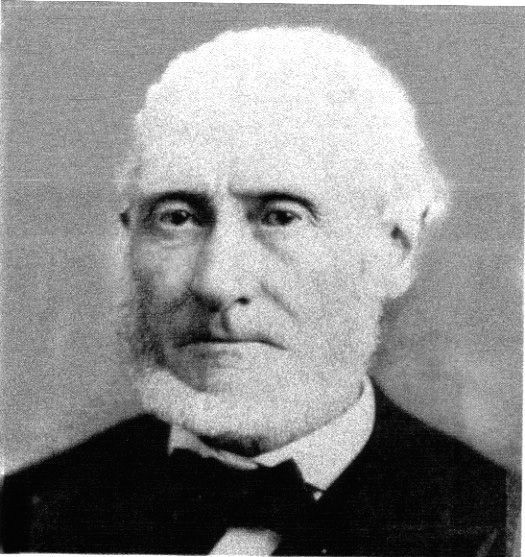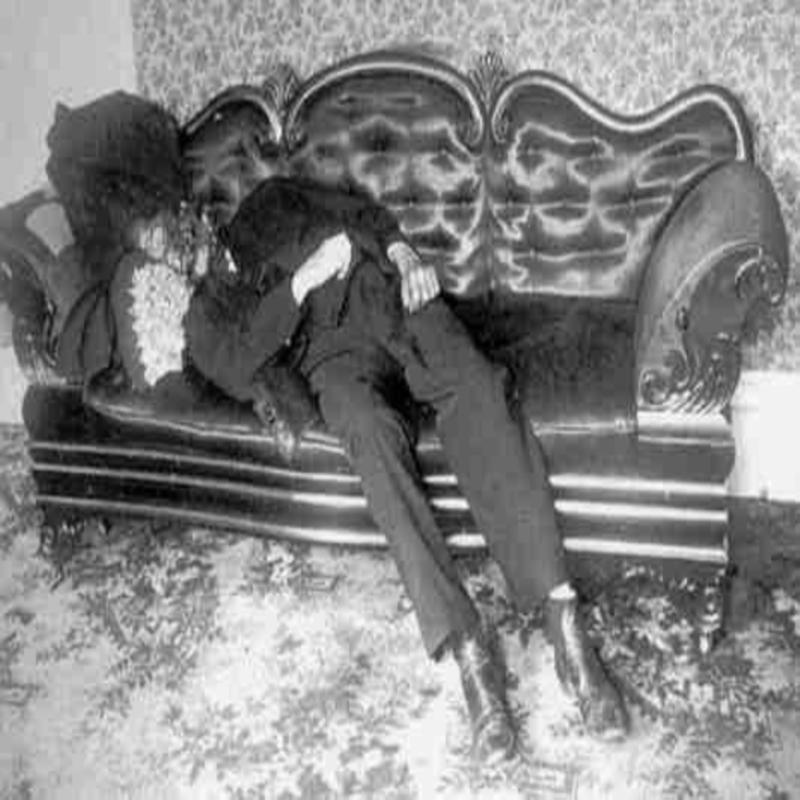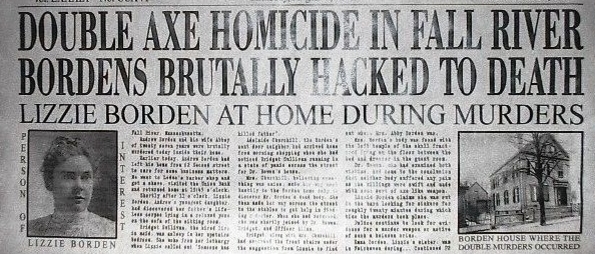Lizzie Borden, Axe Murderer?
Posted on 12th March 2021
“Lizzie Borden took an axe, and gave her mother forty whacks, and when she saw what she had done, she gave her father forty-one.”
So ran the popular refrain and it seemed even the children playing hopscotch on the pavement and skipping in the street never doubted Lizzie’s guilt but she was found to be innocent by a jury of her peers and never convicted of any crime.
Lizzie Andrew Borden was born on 19 July 1860, to respectable middle-class parents in sober, conservative small-town America. As such her life growing up was predictably uneventful. She was a Sunday-School teacher, an active member of the Temperance League, and was involved in many local charities. But she was to gain notoriety as the only suspect in the brutal slaying of her parents at the family home in Fall River, Massachusetts on 4 August 1892.
Lizzie’s father was a wealthy man but theirs was a shabby respectability, the family home on Second Street had no gas lighting, no indoor plumbing and the lavatory was in the basement whilst Andrew Borden himself was not the pillar of the community that some may have been imagined. His fortune had been built upon the misery of others, a slum landlord who acted as his own rent collector, an arrogant, humourless, aggressive and irascible man who was noted for his rapacity and lack of compassion.

Every morning he would do his rounds collecting money with menaces and banking the proceeds. He was understandably unpopular something that troubled his wife Abigail greatly. She had already written to the family doctor claiming that someone was trying to poison them and requesting preventative medicines. It had been just a few days before this request that the entire family had gone down with food poisoning, the entire family except for Lizzie that is, who had chosen not to eat dinner that day.
The relationship between the Borden’s and their two daughters had been strained for some time. Lizzie and her sister Emma lived in separate parts of the house, they rarely spent evenings together and only ever really met at mealtimes. Lizzie never referred to her stepmother as anything other than Mrs Borden even though she had been married to her father for 30 of Lizzie’s 32 years, and was the only mother she had ever known.
On 4 August 1892, Andrew Borden returned home from doing his early morning round at 11.00 as was his custom. He removed his coat and sat upon the sofa looking forward to his regular nap in preparation for a busy afternoon. The family servant Bridget Sullivan was also resting in her room. She was tired and in a sulk over being told to clean the windows on such a hot day. She was woken from her slumbers around 11.30 by a cry of: “Bridget, come quick! Father’s dead! Somebody came in and killed him!”

Bridget rushed down the stairs and into the living room where she encountered a ghastly sight; Andrew Borden was slumped upon the sofa with his face staved in, his left eye socket hanging out and his nose severed. She also found Lizzie standing nearby as if in a trance. The Police were called and while Lizzie was comforted by neighbours Bridget searched the rest of the house discovering the body of Abigail Borden also with her face smashed to a pulp covered with a coat in an upstairs bedroom.
At the subsequent Inquest it was revealed that Abigail Borden had suffered thirteen blows to the face and head; Andrew Borden had been struck eleven times; the wounds to both victims had been caused by repeated blows from an axe or hatchet. Yet very little blood was found at the scene. No valuables had been taken so robbery was ruled out as a possible motive for the murders.
But it was to be Lizzie’s unusual and erratic behaviour at the Inquest held on 9 August that was the talk of the town. She dressed gaily rather than in the mourning clothes that had been expected, displayed little in the way of grief and appeared to be in a dreamlike state. When it came to answering questions, she would often be evasive, ramble incoherently and talk about irrelevancies. She would sometimes laugh hysterically but at no time did she cry.
It was later revealed that her physician Dr Bowen prior to the Inquest had provided Lizzie with morphine sulphate to calm her nerves which may explain some of the vagueness. Her inconsistent and conflicting testimony under questioning only made her indictment for murder a certainty, however. But why would Lizzie Borden murder her parents?

The relationship between Lizzie and her father had been a close and intense one but in recent times it had also become increasingly estranged. She felt smothered and inhibited by the surroundings of Fall River, but her father refused to provide her with the funds to break free of its claustrophobic embrace. In 1890 he had relented a little when he permitted her to join her wealthy cousins on a tour of Europe where for the first time, she was able to live life as she wished but this only made her mood worse upon returning.
In June 1891, a robbery occurred at the Borden home. It had happened when Andrew and Abigail had been away visiting friends and though both Lizzie and Brigitte O’Sullivan had been present in the house, they claimed to have heard nothing. Suspicion immediately fell upon Lizzie who was constantly demanding money and had been known to pilfer in the past.
The following year a feud broke out over money after it was revealed that Andrew Borden had decided to divide his fortune between his own daughters and his wife’s family and had already begun the transfer of property providing a house for his wife’s sister. A huge family row now erupted over what the two girls considered the giving away of their inheritance. In response Andrew Borden gave the girls their recently deceased grandfather’s house and the income it generated but it did little to placate them.
The situation had only been exacerbated by the presence in the house of John Viniculum Morse, Abigail’s brother, who was there to negotiate further transfers of property. But Andrew Borden had not made a Will so were he to die along with his wife then his two daughters would inherit everything. This he told them would have to change and the furious Lizzie and Emma moved out of the family home. But Lizzie soon returned.
The tensions in the Borden household were no secret to those who knew them, and it was only a surprise that Andrew had managed to so contain the fall out for so long.
Lizzie Borden was arrested and indicted for the murder of her parents on 11 August 1892, the news spread rapidly causing a sensation not because a woman committing murder was unknown, but poison was their preferred weapon of choice and the very idea that a woman would savagely hack and beat her own parents to death with an axe was unthinkable. It flew in the face of nature they said and couldn’t possibly be true.
Lizzie was tried at the New Bedford Courthouse in Massachusetts before an all-male jury.
Campaign groups formed to support Lizzie and prominent friends of the family had raised enough money to hire the former Governor of Massachusetts George D Robinson, an experienced criminal attorney as her Defence Counsel for which he was paid $25,000.
Robinson, ably assisted by Andrew Jennings spent many hours coaching Lizzie how to behave. In the Courtroom she was to present herself as the very personification of femininity and all its many supposed virtues – she dressed all in black, stylish but not so much so that it would deflect from her evident state of mourning, and she wore gloves throughout. She also carried flowers into the Courtroom with which to hide her face whenever the more gruesome details of the murder were related when she would often be seen to swoon as if about to feint while her expression remained shielded from the public gaze.
The Prosecution Counsel, District-Attorney Norton and William H Moody were both convinced of Lizzie’s guilt but with public opinion firmly against them it would be a difficult case to win.
The evidence against her was certainly incriminating but it was mostly circumstantial. No murder weapon was found though a hatchet with the handle removed (possibly to disguise the fact that it was covered in blood) was found in the garage. It was also revealed that prior to the murders Lizzie had tried to purchase prussic acid from the local pharmacy. She said it had been to clean a seal-skin coat though no such coat could be produced. The pharmacist Eli Bence had refused to sell her the acid and was willing to testify so at the trial but was denied the opportunity to do so. The absence of blood at the scene of the crime was also brought up.
A neighbour, Adelaide Churchill, who comforted Lizzie while they awaited the arrival of the police, testified that she saw no blood and that Lizzie was perfectly arranged and not dishevelled in any way. Lizzie, however, had been witnessed burning a blue dress in the kitchen stove shortly after the murders. Why the dress she was wearing at the time was not among her clothes that had been removed by the police from the scene of the crime for inspection also remained unanswered.
It was suggested at the trial that Lizzie had committed the murders whilst naked and used the blue dress to clean up the blood or had removed it to do so. Also, aware of the lay-out of the house, Lizzie would have known that it was possible to murder her father without having to emerge from behind the door thereby avoiding blood-spattering.

Despite her discreet use of the flowers Lizzie’s attitude during the trial was described as one of callous indifference and public opinion in her favour began to fracture. Fortunately for Lizzie her testimony at the earlier Inquest was declared inadmissible because her Attorney had not been present. She also received a further piece of good news when information was received that a similar murder had been committed in Fall River by a vagrant named Jose Correia. Though it could be proved that he was not in town at the time of the Borden murders it gave substance to Lizzie’s claim that the murders could have been committed by a stranger.
The Prosecution now produced witnesses to Lizzie’s character and there were any number of people willing to testify that she was arrogant and selfish. A cousin, Hiram Harrington, testified that she was of a repellent disposition and that after a disagreement with her father would become sulky and refuse to speak to him for days on end. He also went onto state that whenever her father refused to let her entertain lavishly, she would become angry and uncooperative in every way.
Lizzie’s Defence Counsel in response emphasised Andrew Borden’s unpopularity. They produced evidence that a mysterious man had arrived at the house in the days just prior to the murders and argued furiously with Andrew on the doorstep. Evidence was also shown that Abigail Borden had received threatening letters. It was later revealed that this evidence had been provided by Lizzie herself and could not be verified by any other source.

Upon the conclusion of the trial the Jury retired for just 90 minutes before returning with a verdict of not guilty. They could not see what would drive this prim, chaste, church-going woman to murder while the evidence against her was inconclusive. To many of the public who had been disturbed by her behaviour during the trial and offended by the airs-and graces she gave herself upon its conclusion she was as guilty as sin.
After the trial Lizzie and Emma moved to a grand new house with fourteen rooms and servants, they named Maplecroft. Lizzie also changed her name to Lizbeth, but she was no longer welcome at her Church and was shunned by Fall River Society but cushioned by her inheritance she was like a woman reborn.
She became heavily involved in the theatre and began an often-tempestuous affair with the notorious actress Nance O’Neill. She now squandered the family fortune on entertaining her theatrical friends and holding the lavish parties she had always longed to do. After one such party in 1905, she argued with her sister over the amount of money she was spending. Emma soon moved out of the house they shared; the two sisters never spoke again.
Lizzie Borden died of pneumonia on 1 July 1927. Though she had lived in Fall River all her life few people attended her funeral, they had long ago ostracised her. Her theatrical friends also thought it best not to do so.
In her will she left $30,000 to the Fall River Animal Rescue though she was known not to like animals and had never had a pet. She also left $500 in perpetuity for the upkeep of her father’s grave, but nothing for the upkeep of her mother’s.
Many years later a retired nurse Ruby Cameron, who had cared for Lizzie in her old age reported that she told her that at the time of the crime she’d had a boyfriend and that he had hidden in the closet before committing the murders on her behalf.
Just 9 days after Lizzie’s death her sister Emma died following a fall at her home.
Other than Lizzie no other strong suspect has ever emerged in the case of the Borden murders.
As the only other person known to be in the house at the time the maid Bridget Sullivan had as much opportunity to commit the murders as Lizzie did but what would be her motive, a sense of grievance perhaps? She certainly never gained financially from the murders and would simply have put herself out of work. Lizzie’s sister Emma, who did gain financially from her parent’s death, certainly had a motive but she was living away from home at the time. Travelling to and from the Borden house on the day of the murders without being seen seems unlikely. It has also been suggested that Andrew Borden had an illegitimate son who was demanding his share of the family fortune and that this was the man who had argued furiously with Andrew in the days immediately prior to the murders. But still the only evidence for this ever having happened came from Lizzie herself.
Did Lizzie Borden kill her parents? The Jury found no, but the Court of History has yet to decide.
Tagged as: Miscellaneous, Women
Share this post:





